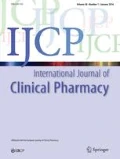Abstract
Objectives: To compare the population consenting for a study of the effectiveness of a pharmacist‐run medication review clinic with the population not consenting for patients aged over 65 years old with respect to age, sex and number of repeat medicines. To explore the reasons why some patients declined to consent to the study.Methods: Letters were sent to 2,403 patients aged 65 and over and taking at least one repeat medicine from 4 general practices. If no reply was received to a second letter they were followed up by telephone. If they declined to consent they were asked for their reasons. Data for consenting and non‐consenting patients was collected on the stratification factors: age, sex and number of repeat medicines. Multiple logistic regression was used to assess the association of each factor with consent rates.Results: Consenting patients were dissimilar to non‐consenting patients. Patients were less likely to consent if they were older, OR (95% CI) = 0.54 (0.46,0.64), or female, OR (95% CI) = 0.74 (0.63,0.88). Patients were more likely to consent if on 5 or more repeat medicines: OR (95% CI) = 1.3 (1.1,1.5). Ten broad categories of reasons why patients did not wish to participate were identified from the patient interviews.Conclusions: Patients were less likely to give their consent if they were elderly, female and on fewer repeat medicines. A number of administrative and behavioural factors were identified which reduced the chances of informed consent being given. These factors need to be addressed to maximise numbers of consenting patients in medication review studies.
References
Llewellyn-Thomas HA, McGreal MJ, Thiel EC, et al. Patients' willingness to enter clinical trials: measuring the association with perceived benefit and preferences for decision. Soc Sci Med 1991;32(1):35-42.
Britton A, McKee M, Black N, et al. Threats to applicability of randomised trials: exclusions and selective participation. J Health Serv Res Policy 1999 Apr;4(2):112-21.
Gorelick PB, Harris Y, Burnett B, Bonecutter FJ. The recruitment triangle: reasons why African Americans enroll, refuse to enroll, or voluntarily withdraw from a clinical trial. An interim report from the African-American Antiplatelet Stroke Prevention Study (AAASPS). J Natl Med Assoc 1998 Mar;90(3):141-5.
Dowling GA, Wiener CL. Roadblocks encountered in recruiting patients for a study of sleep disruption in Alzheimer's disease. Image J Nurs Sch 1997 Spring;29(1):59-64.
Fairhurst K, Dowrick C. Problems with recruitment in a randomized controlled trial of counselling in general practice: causes and implications. J Health Serv Res Policy 1996 Apr;1(2):77-80.
Goodyear L, Lovejoy A, Nathan A, Warnett S. Brown Bag Medication Reviews in Community Pharmacies. Pharm J 1996;256:723-5
Lowe C, Petty DR, Zermansky AG. Development of a method for clinical medication review by a pharmacist in general practice. Pharm World and Sci 2000;22(4):121-6.
Mackie CA, Lawson DH, Campbell A, et al. A randomised controlled trial of medication review in patients receiving polypharmacy in general practice. Pharm J 1999;263:R7.
Sykes D, Westwood P, Gilleghan J. Development of a review programme for repeat prescription medicines. Pharm J 1996;256:458-60.
Goldstein R, Hulme H, Willits J. Reviewing repeat prescribing-general practitioners and communits pharmacists working together. Int J Pharm Prac 1998;60-6.
Tremellen J. Assessment of patients aged over 75 in general practice. BMJ 1992;305:621-4.
Sugarman J, McCrory DC, Hubal RC. Getting meaningful informed consent from older adults: a structured literature review of empirical research. J Am Geriatr Soc 1998 April;46(4):517-24.
Adams J, Silverman M, Musa D, Peele P. Recruiting older adults for clinical trials. Control Clin Trials 1997 Feb;18(1): 14-26.
Office of Population Census and Surveys. Morbidity statistics from general practice, fourth national study 1991-1992. London. HMSO. 1995 series MB5 No3).
Ward E, King M, Lloyd M, et al. Conducting randomised trials in general practice: methodological and practical issues. Br J Gen Pract 1999;49:919-22.
Author information
Authors and Affiliations
Rights and permissions
About this article
Cite this article
Petty, D., Zermansky, A., Raynor, D. et al. "No thank you": Why elderly patients declined to participate in a research study. Pharm World Sci 23, 22–27 (2001). https://doi.org/10.1023/A:1011276924820
Issue Date:
DOI: https://doi.org/10.1023/A:1011276924820

